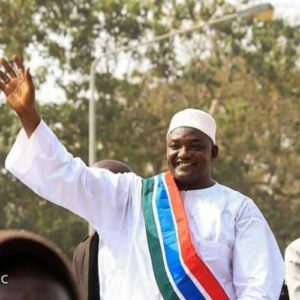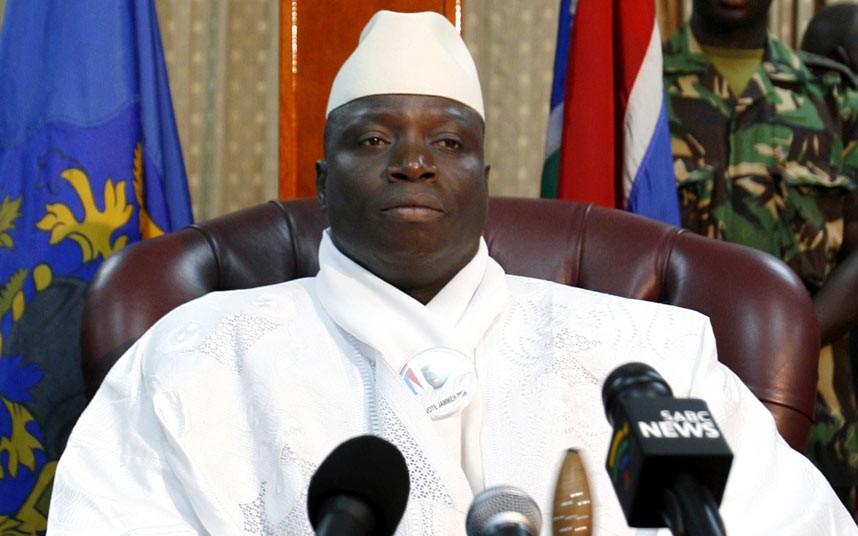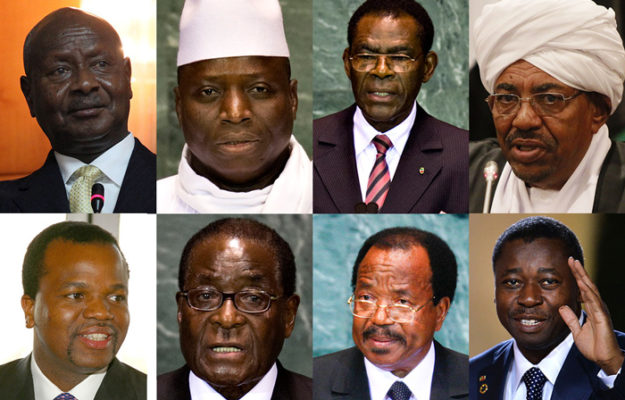Yahya Jammeh, the autocratic ruler of The Gambia, has moved to resist his presidential election defeat, sending armed soldiers to take control of the electoral commission headquarters and filing a petition to the supreme court as a delegation of African leaders urged him to stand down…
Making up the most important delegation ever to descend on The Gambia, the presidents of Nigeria, Liberia, Sierra Leone and Ghana flew in on Tuesday to meet Jammeh, who has ruled an increasingly isolated nation for 22 years and last week vowed to stay on despite losing the presidential election.
Asked if Jammeh had been receptive after their hour-long closed-doors meeting, the Liberian president, Ellen Johnson Sirleaf, said that no deal had been reached.
(London Guardian, December 13, 2016)
Alas, Jammeh is just the latest African despot attempting to hold on to power by force. In fact, here is how I bemoaned this lingering pathology in “Africa’s Democratic Despots Now Includes Gbagbo of Ivory Coast,” December 15, 2010:
_____________
African leaders once personified unbridled despotism. Now they’re personifying the growing spectacle of leaders refusing to give up power after losing free and fair elections; hence their oxymoronic designation: democratic despots.
This has led to an untenable new norm developing on the Continent, where opposition leaders – who win clear and convincing elections – are being forced to either enter into shotgun marriages (i.e., coalition governments) with sore losers or lead civil wars to oust them by force…
Now it seems that President Laurent Gbagbo of Ivory Coast is determined to follow suit. Because, like Kibaki and Mugabe and their respective ruling parties, Gbagbo and his ruling party have summarily invalidated election results that gave opposition leader Alassane Ouattara a 10-point victory in last month’s presidential election.
Also, like Kibaki and Mugabe, Gbagbo has given the finger to patently feckless international demands – most notably from United Nations, France, the United States, the European Union, the African Union and regional bloc ECOWAS – for him to step down.
_____________
It eventually took military force to remove Gbagbo. I fear it will take the same to remove Jammeh.
In fact, I’m willing to bet that it’s only a matter of time before Jammeh ends up either like Gbagbo, in The Hague rotting away in jail, or like Laurent Kabila of the Congo, dead. They never learn.
As it happened, no less a person than President Obama bemoaned the persistence of this “Big Dada” pathology during his last state visit to Africa:
Africa’s democratic progress is also at risk when leaders refuse to step aside when their terms end…
I don’t understand why people want to stay so long … especially when they’ve got a lot of money…
You look at Nelson Mandela – Madiba, like George Washington, forged a lasting legacy not only because of what they did in office, but because they were willing to leave office and transfer power peacefully.
(WhiteHouse.org, July 28, 2015)
And, as it happened, I provided a little preemptive insight for Obama in “Ukraine’s Orange Revolution Turns ‘Red,’” February 25, 2014. And, yes, I used a notorious white despot to counter the prevailing view that only African leaders seek to hold on to power by hook or by crook these days.
__________________
It would make a mockery of the Cold-War principles he governs by if Putin allows these Ukrainian revolutionaries to put his puppet Yanukovych on trial – the way Egyptian revolutionaries are doing with their former leaders Hosni Mubarak and Mohamed Morsi; or worse, if he allows them to execute Yanukovych in the streets like a bunch of hungry hyenas devouring a gazelle – the way Libyan revolutionaries did with Muammar Gaddafi.
 After all, Putin has made no secret of his contempt for what he decried as Obama’s failure to protect America’s puppet leader, Mubarak, from avenging mobs.
After all, Putin has made no secret of his contempt for what he decried as Obama’s failure to protect America’s puppet leader, Mubarak, from avenging mobs.
Let me hasten to clarify, however, that Putin’s contempt was and remains entirely self-interested. Because his only reason for standing in solidarity with everyone from Zine El Abidine Ben Ali of Tunisia to Yanukovych of Ukraine is that he lives in mortal fear that the popular uprisings that toppled them might topple him too. Period.
This is why he must’ve been a little unnerved yesterday when even pro-Russian Ukrainians were calling for Yanukovych’s head. This, after they got a glimpse at the obscenely opulent, Louis-XVI lifestyle he was living at their expense. So just imagine what Putin’s peasant supporters in Russia would want to do to him. After all, he lives a lifestyle that’s a thousand times more extravagant than Yanukovych’s, having amassed tens of billions in ill-gotten gains over the years as a KGB officer turn politician.
After eight years in power, Putin has secretly accumulated a fortune of more than $40bn. The sum would make him Russia’s (and Europe’s) richest man.
(“Putin, the Kremlin Power Struggle and the $40bn Fortune,” London Guardian, December 21, 2007)
Trust me, Putin lords over a kleptocracy that has fleeced public funds on such an unprecedented scale, it makes the kleptocracies African despots lord over seem petty. Which of course is why he is so anxious to stoke the combustible geopolitical crisis in Ukraine to deflect the international media from drawing unavoidable parallels between Yanukovych’s dubious accumulation of wealth and his. Far better, for example, to get Russians drunk with pan-Russian pride than to have them pose sober questions about the billions he and his cronies embezzled from the $50-billion price tag for the Sochi Olympics.
____________________
 Sure enough, within hours of the electoral commission declaring opposition leader Adama Barrow the winner of The Gambia’s December 1 presidential election, senior members of his coalition began exhorting him to prosecute Jammeh for corruption and human rights abuses. Given this, one can hardly blame Jammeh for refusing to concede….
Sure enough, within hours of the electoral commission declaring opposition leader Adama Barrow the winner of The Gambia’s December 1 presidential election, senior members of his coalition began exhorting him to prosecute Jammeh for corruption and human rights abuses. Given this, one can hardly blame Jammeh for refusing to concede….
Of course, with all due respect to Putin, Jammeh could look right in his neighborhood to Robert Mugabe of Zimbabwe for guidance on how to rule as a de facto president for life (i.e., while defying the fate that befell Gbagbo and others).
Not least because, like Mugabe, Jammeh transitioned from military commander to political leader: the former 36 years ago, the latter, 22. And, despite promising democratic reforms from day one, like Mugabe, Jammeh seems determined to cede power only if another military commander seizes it from him.
So democratic elections be damned. In point of fact, Mugabe has done in Zimbabwe on several occasions what Jammeh is attempting to do in The Gambia today. What’s more, he blithely ignored the same kinds of international censure and sanctions Jammeh is now facing.
In the end, all one could do was decry his trampling over the will of his people, which I did in “Mugabe Swears Himself In as President For Life,” June 30, 2008, and “In Zimbabwe It’s Hail, Mugabe! … Again,” August 4, 2013.
Related commentaries:
Gbagbo…
Ukraine…
Hail Mugabe…

